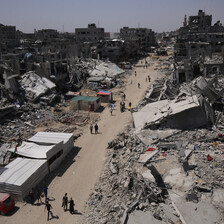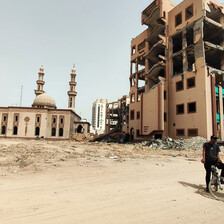The Electronic Intifada 21 August 2024

Palestinian education is being destroyed and children injured and killed in Israel’s genocidal onslaught.
ZUMAPRESSThe genocidal Israeli war in the Gaza Strip has deliberately targeted all aspects of life in the besieged enclave, including the educational system. Its destruction is an integral part of the Israeli plan to collectively punish and eradicate Palestinians in Gaza after the Hamas-led 7 October 2023 attacks in Israel.
The educational system, which the global COVID-19 pandemic had already disrupted, has received hit after hit from Israeli missiles and artillery.
According to the Palestinian Ministry of Education, the Israeli military has killed more than 9,900 students in Gaza and wounded nearly 16,000 more between 7 October and early August 2024. More than 500 teachers, lecturers, professors and education staff have also been killed, and more than 3,400 others injured, mostly in the Gaza Strip but in the West Bank as well.
“The level of destruction of the educational system and its elements is unprecedented as Israel has targeted everyone and everything involved in the educational process in Gaza,” ministry spokesperson Sadiq al-Khadour told The Electronic Intifada in an 18 July online interview.
“We’re not only talking about targeting the people and stones that form and build the educational system, but also targeting everything that facilitates it, including the telecommunication network, electricity and water system,” he said.
What goes on at schools and universities can be a reflection of everyday life.
When, according to a UN tally, Israel targets and deprives some 625,000 students in Gaza of their right to receive a decent education, which is the cornerstone to building any society, it erases the past, seizes the present and wreaks havoc on the future of all Gazans.
Community loss
Not only have students in Gaza lost many of their skills, either on the cognitive level or the emotional and the personal, but the community as a whole has lost an integral part of its life.
“I was supposed to graduate high school this summer and finally pursue my bachelor’s degree in college. This war, however, made me feel like I needed to revise all my 12 years at school. I have forgotten everything I have ever learned,” said Abdul Rahman Mansour, an 18-year-old student from Gaza.
He was displaced to the al-Fukhari area in northeast Khan Younis. There, he launched an initiative called “I have the right to learn” in which he reached out to several teachers. These teachers provided online lessons for him and some fellow students.
On the emotional and social side, the war has torn the students’ relationships apart. First, it has separated the northern half of Gaza from the south, and then it has forced the students to be on the move constantly as they flee their places of residence due to the continuous Israeli raids on different parts of the coastal territory.
The destabilization makes many students in Gaza feel lost, with no plans or concerns for their academic future, leaving them with only one preoccupation: how to survive the nonstop Israeli bombardment from one side and the repeated ground invasions from the other.
“Whenever they [the Israeli army] issue a new displacement map that includes my area in Bani Suhaila, east Khan Younis, I look at my brown backpack. I know it’s time to unpack my school books and novels, and put in my prayer clothes and two pajamas instead,” said Doaa Sami, a 17-year-old student who was displaced to al-Mawasi, west of Khan Younis, multiple times over the last few weeks.
“I always stuff my math and chemistry books between clothes as I love these subjects,” Doaa said. “I wish I could have the time to study them, but the only math I keep doing is counting my family all the way from my neighborhood to al-Mawasi, as we always take the distance on foot and move among thousands of people.”
As for teachers, professors and education ministry staff, the continuing genocide has not spared them. Israel has been targeting Palestinian academics since day one.
Perhaps the most well-known case is the assassination of Dr. Refaat Alareer, a professor of literature and creative writing, in December 2023. This continued with the killing of Yousef al-Kahlout, an Arabic language professor, in the “Dawn Massacre” of 10 August 2024, when Israel bombed a prayer hall inside Tabaeen school, which was serving as shelter for the displaced.
The early morning attack killed scores of people, including Islamic University lecturer Muhammad al-Ghafri and academic and school principal Muhammad al-Taif.
Many teachers and professors have been suffering financially, especially those who work for the Gaza government. They haven’t received salaries for months, deepening their anguish, especially as consumer prices are skyrocketing.
Saving the academic year
The destruction of the educational infrastructure is a huge problem facing everyone involved in the learning process. According to the government media office in Gaza, Israel has destroyed 121 schools and severely damaged 333 others.
The education ministry’s vision is to return to traditional teaching in the classrooms, although al-Khadour said this can’t happen unless there is a ceasefire.
“The current situation requires a non-systematic solution,” al-Khadour said. In “saving the academic year, we mean in practical terms to compensate for the educational loss among the students in Gaza.”
Al-Khadour pointed out that Gaza needs 4,500 fully functioning classrooms while implementing the two-period system of classes for some students in the morning and for the rest in the afternoon.
He added that the experience gained during the COVID-19 pandemic would be valuable. Back then, the ministry adopted the “packages system,” which focuses on using specialized material in the core subjects of Arabic, English, math and science.
Palestinians have learned how to cope with many Israeli restrictions and obstacles over the years. The best example might be the way the educational process continued in various forms during the frequent Israeli raids and curfews of the first intifada.
“Of course, what has been achieved during the first intifada, including endorsing the self-learning method among families, can be built upon, even though the current situation is much worse as there are very limited spatial alternatives,” al-Khadour said about home schooling efforts.
Searching for simple solutions to restore the educational system is a critical requirement; nonetheless, the current plight of students is not without complexity and turmoil as efforts are made to save students from the storm of ignorance that circles them.
Despite many voluntary attempts from either independent associations or individuals to dust off the rubble and advance students’ futures, the massive gaps and the huge educational loss among students cannot be bridged unless there is a combined international effort to rehabilitate and fund the educational process.
Qasem Waleed El-Farra is a physicist based in Gaza.





